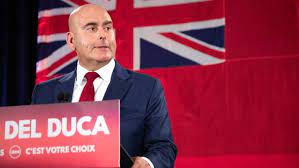Is Canada slipping into a ‘one-and-done’ party leader pattern? – By Christian Paas-Lang (CBC) / June 12, 2022
According to political scientists, leaders’ longevity is all about expectations
This is an excerpt from Minority Report, a weekly newsletter on federal politics. If you haven’t subscribed yet, you can do that by clicking here.
When Ontario Liberal Leader Steven Del Duca said he would resign in the wake of last week’s provincial election, he became the latest addition to a big group of Canadian party leaders to get only one kick at the electoral can.
Conservative leaders Andrew Scheer and Erin O’Toole only got one shot. Liberal leaders Stéphane Dion and Michael Ignatieff were afforded just one opportunity each. Iain Rankin in Nova Scotia and Andrew Wilkinson in B.C. each only had a single chance to win.
Almost all of those leaders resigned. But it certainly appeared they were quitting, amid internal party pressures, to avoid the embarrassment of being ousted.
It’s not so for every leader. On the same night that Del Duca resigned after one election as leader, Andrea Horwath resigned after four atop Ontario’s NDP. Stephen Harper lost his first election, before winning the next three. Robert Stanfield got three strikes before Joe Clark took over the federal Tories. The most extreme examples, Wilfred Laurier and Mackenzie King, each led their parties in seven elections, with a few losses sprinkled in among the victories.
CONTINUE > https://www.cbc.ca/news/politics/party-leader-one-election-loss-1.6484880



















